Almond milk is a popular alternative to dairy milk and an enjoyable option to combine with protein powder.
It is relatively mild in flavor and blends well in smoothies, milkshakes, and other health drinks.
Because of the nutritional value of almond milk, it has become a household grocery item used for a ton of different recipes.
Mixing almond milk with protein powder has numerous benefits like being low in calories, providing extra carbohydrates, and making the drink smooth and rich. Unsweetened almond milk has significantly fewer calories, fat content, and sugars than cow’s milk. It is also fortified with numerous vitamins and nutrients.
This article will cover the best ways to mix almond milk with whey protein powder and how to achieve optimal results when doing so.
Can You Mix Almond Milk With Whey Protein Powder?
Yes, you can mix almond milk with whey protein powder.
When used in smoothies or shakes, almond milk creates a smooth and creamy texture and rich flavor.
Its mild taste compliments most smoothie ingredients, like fruit, vegetables, and of course, protein powder.
Almond milk is also lactose-free, meaning those avoiding dairy can drink this stress-free.
Whey protein isolate powders also have very little to zero lactose, so the combination is a great match.
Note that whey protein concentrate powders are high in lactose, so combining them with almond milk would no longer be lactose-free.
Benefits of Mixing Almond Milk With Protein Powder
There are many benefits to using almond milk in your protein drinks. Here are just a few:
Added Nutrients
Many almond milks are supplemented with vitamins and minerals, increasing the nutritional value.
Almond milk is often fortified with calcium, vitamin A, vitamin E, and vitamin D.
Lactose Free
Almond milk is lactose-free, making it a suitable option for folks with lactose intolerance.
Lactose can be uncomfortable to digest, even for those without an intolerance. Almond milk, being water-based, avoids these issues.
Low Calorie
Almond milk contains calories and carbohydrates, so it will help replenish you for a pre or post-workout drink.
There are only 30-40 calories per cup of unsweetened almond milk, whereas a cup of whole milk contains 150 calories.
Related: Almond Milk vs. Cow's Milk
Smoother Consistency
Almond milk provides a richer, creamier consistency than water. It is a tad more filling and will yield a different texture than water when used in smoothies.

Tips For Mixing Almond Milk With Protein Powder
Here are a few tips to ensure you are consuming the healthiest and most enjoyable almond milk.
Use Unsweetened Almond Milk
Unsweetened almond milk has less sugar and calories than sweetened almond milk.
If your primary goal is weight loss, you will want to avoid the excess calories and stick to an unsweetened version.
A cup of sweetened almond milk contains 12 grams of sugar, which is equivalent to 3 teaspoons of sugar!
Use Almond Milk Without Additives and Preservatives
Many almond milks that you can buy at the store are full of additives including oils, gums, and emulsifiers.
They may have far less actual almonds in them than you would hope.
For example, the popular brand Almond Breeze only consists of 2% almonds.
Most people drink nutritional shakes for the health benefits.
Ingredients like gellan gum, sunflower lecithin, and carrageenan, though not necessarily unhealthy, are not exactly what a health-conscious person wants to consume daily—especially when there are plenty of options without these additives.
Use a Protein Powder That Mixes Well
Cheaper protein powders that are full of fillers and additives get clumpier than their high-quality counterparts.
To reduce the number of clumps you’re finding, try adding less powder. You might be overloading it and not allowing the clumps to dissolve fully.
Also, adding the powder after adding your liquid prevents clumps from forming and getting stuck at the bottom of the cup/blender.
If mixing almond milk and protein powder in a blender bottle, add an ice cube to help rattle around the powder.
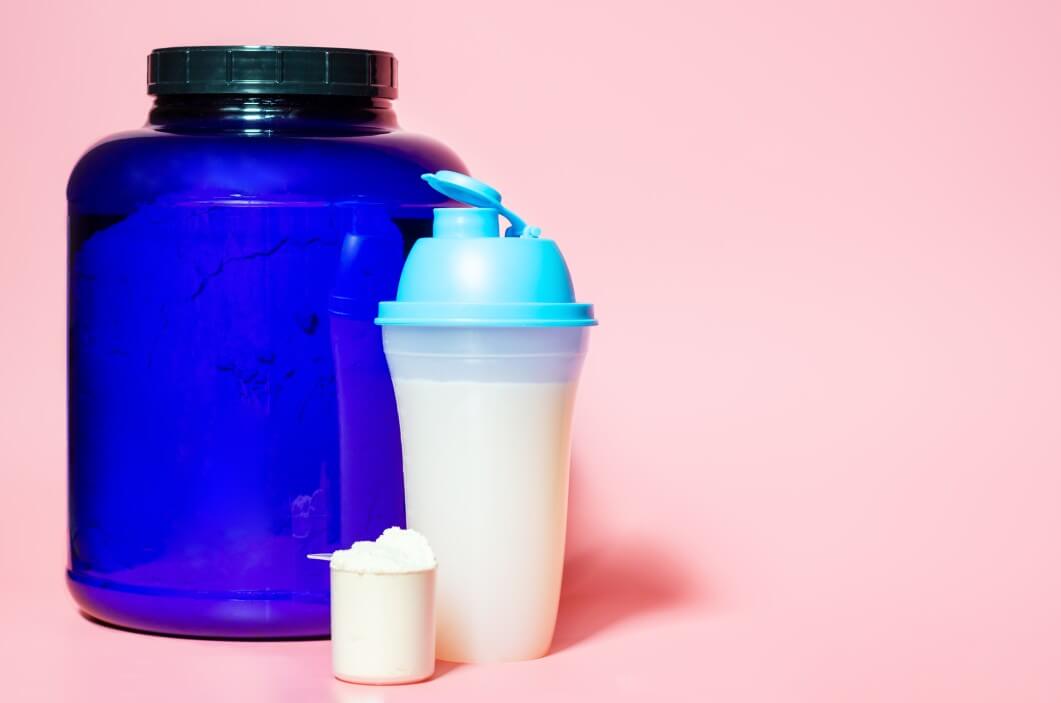
How Much Almond Milk Should I Mix With Protein Powder?
The last thing you want is a chalky smoothie that tastes more like powder than anything else.
On the flip side, you do not want to deprive yourself of the nutritional values that protein powder adds to a shake.
To be sure, follow the instructions on your protein powder label. The proper amount depends on the size of your smoothie/shake/pre-workout drink.
Generally speaking, most protein powder brand recommend mixing one serving with 8-12 oz of liquid.
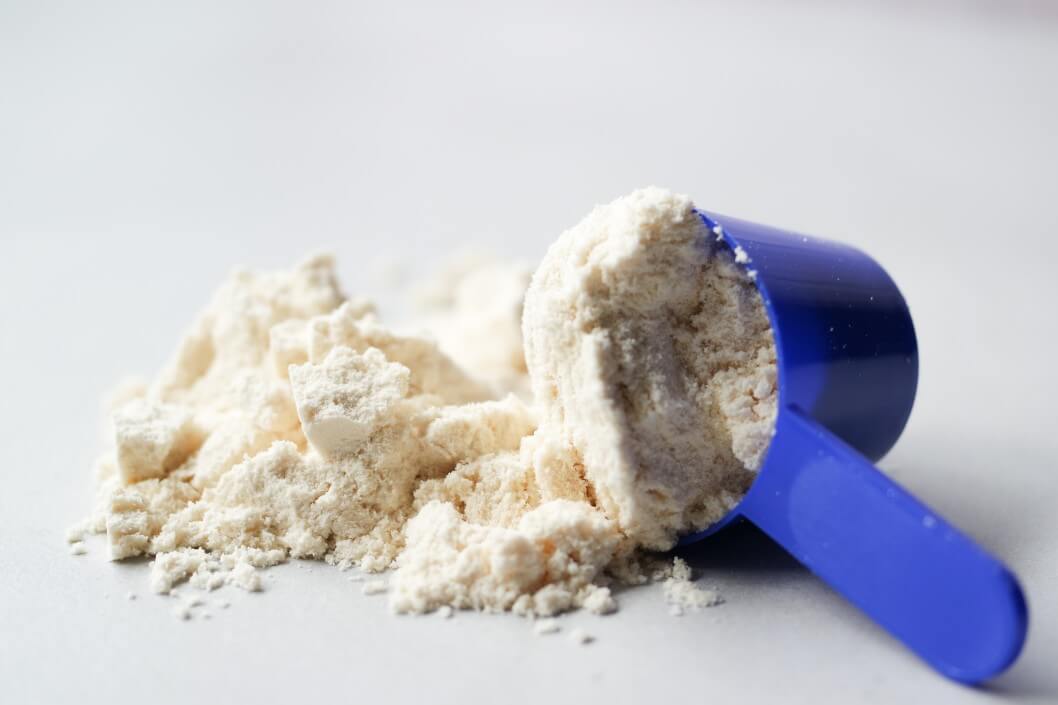
Is Almond Milk or Water Better For Protein Shakes?
Whether you use almond milk or water in your protein shake is a matter of preference.
Free of calories and sugar, water is preferable for those seeking weight-loss or sugar-free diets.
Almond milk yields a thicker shake and contains both carbs and calories, which weight-lifters would prefer.
Almond milk is satisfying for those craving the richness of milk and also contains some vitamins, which is a plus. Water makes a thinner, less filling drink.
So, if you are planning to chug some protein powder down after an intense workout, using water will be more hydrating and easier to get down.
However, we prefer almond milk because it’s low calorie but still provides you with some much-needed nutrients. Plus, it tastes better!
Related: What Does Almond Milk Taste Like?
Can I Drink Almond Milk and Whey Protein Before Bed?
Drinking an almond milk and protein drink before bed has actually been found to increase muscle mass and strength in men who workout regularly.
If it is bulking season and you want to put on the gains, drinking a protein shake right before bed can help you in that process!
The American College of Sports Medicine also found that taking protein before a night’s sleep improves post-exercise muscle recovery.
In layman's terms, it may help your muscles recover after a hard workout or reduce the amount of time you feel sore.
On the other hand, if you do not want to gain weight, this is probably not the best idea for you.
Consuming calories and sugar right before bed could result in weight gain, especially if you don’t exercise regularly.
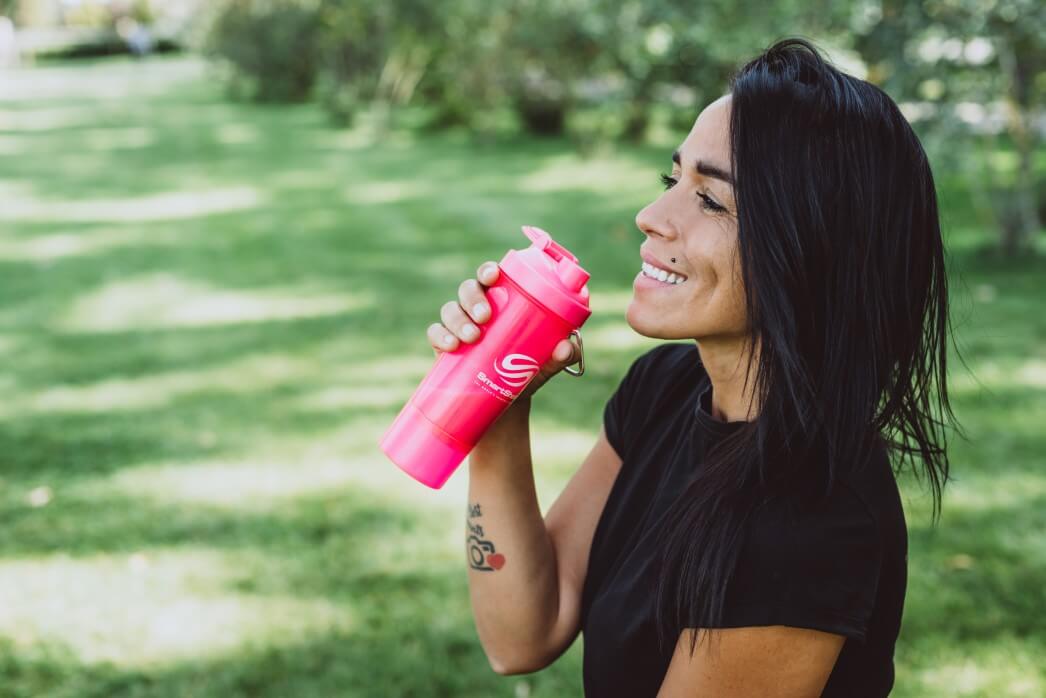
Are Almond Milk and Protein Powder Good For Weight Gain?
Almond milk is relatively low in calories and will not promote weight gain as much as whole milk will.
To gain weight, you want to consume more calories than you burn.
Unsweetened almond milk has about 30 calories, sweetened almond milk has 60-80 calories, whereas a cup of whole milk contains 150 calories.
Are you looking for a plant-based milk with high calories? Try oat milk, walnut milk, rice milk, or coconut milk instead. They all contain over 100 calories per serving, while still being nutritious.
Best Protein Powder For Almond Milk
There is a myriad of protein powders for all preferences, from vegan powders to collagen powders, to mass gain powders.
Your diet and fitness goals will dictate which is the best for you. Below are a few suggestions based on different dietary preferences.
Best For Vegans: Four Sigmatic
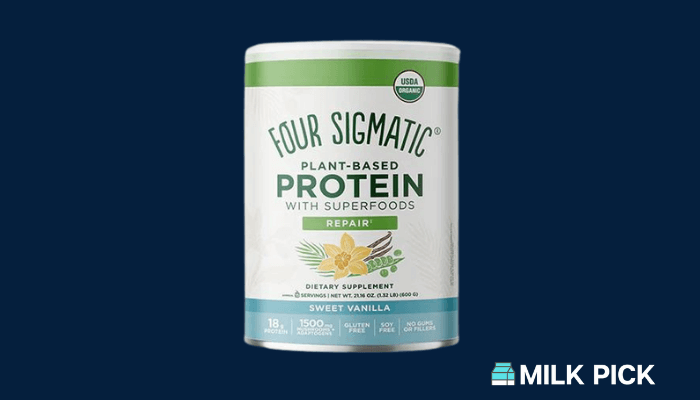
If you are drinking almond milk to coincide with your plant-based diet, you likely want a plant-based protein powder.
One of our favorites is the Four Sigmatic plant-based protein. Not only is it organic and gluten-free, but it contains numerous mushrooms and only 2 grams of sugar!
This protein comes in a variety of flavors like cacao, peanut butter, vanilla, mocha, and unsweetened.
You do not have to worry about what’s in it because everything is of the earth. It’s great in smoothies, pancakes, and oatmeal – you name it!
Best Whey Protein: Levels
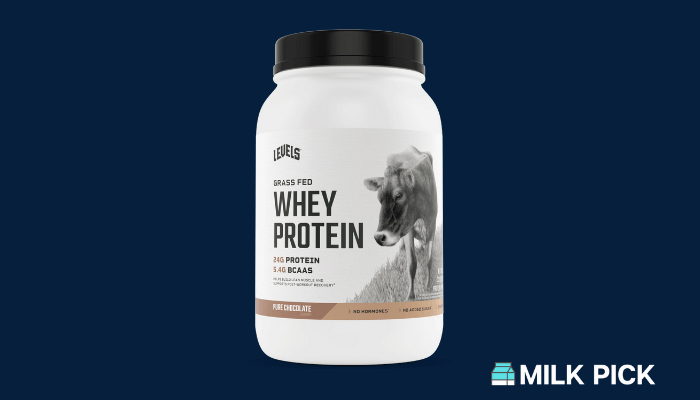
One whey protein brand that is tried and true is Levels.
They pride themselves on being high in protein at 24 grams per scoop, and free of “bogus fillers.”
The ingredients list is short and high-quality, including grass-fed and hormone-free origins.
Best Collagen: Ancient Nutrition
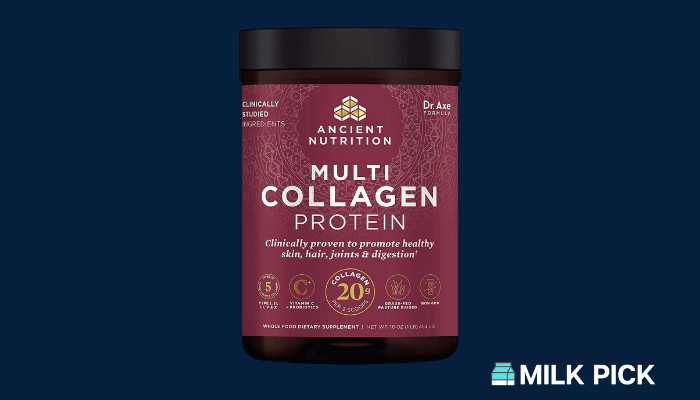
Collagen is a type of protein mostly comprised of amino acids. It’s found in skin, joints, and bones, and is taken to support the health of those body parts.
Studies show that taking collagen improves the elasticity of skin.
The Ancient Nutrition Multi Collagen Protein is free of GMOs, dairy, and gluten. It also is jam-packed with vitamin C and probiotics!
Conclusion
When deciding on the best milk to mix with your protein powder, make sure to consider your personal health objectives.
Almond milk is an excellent choice for its vitamin contents and flavor. It has many benefits, including nutrient content, caloric value, flavor, and dairy-free ingredients.
Almond milk has more calories and carbs than water but less than whole milk.
Unsweetened almond milk is the healthiest option, especially one that is free of filler ingredients like gums, oils, and “natural flavors.”
One key takeaway of this article is that most store-bought almond milks contain a high amount of filler ingredients that improve the taste and texture. The almond content may be lower than you desire. Make sure to check the labels or make your own at home!
